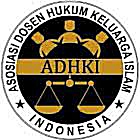Abortion Due to Fetal Defects (Legal Analysis of Legislation and Fatwa of Ulama Mufti Bayan Linnas Number 68)
Aborsi Karena Cacat Janin (Analisis Hukum Terhadap Peraturan Perundangan dan Fatwa Ulama Mufti Bayan Linnas Nomor 68)
Abstract
Abortion is a word that symbolizes a crime in which the perpetrator must be punished because it is considered to have taken away a human being's right to life. However, sometimes abortion has to be carried out because if the pregnancy continues, the mother's life will be at stake due to the disability suffered by the occupant of her womb. Defects experienced by the fetus must be declared by a recognized medical expert in the field of pregnancy. This research question is how the laws and fatwas from Malaysian mufti clerics conclude the legal status of abortion due to fetal defects. In this research the author uses library research methods and is normative juridical in nature. Malaysia does not have specific laws governing abortion, so everything related to abortion will refer to Penal Code Section 312-316 (Act 574). Dr. Zulkifli Mohamad Al-Bakri, former Minister of Religion and Mufti of the 7th Federal Region stated in an article uploaded to Bayan Linnas No. 68 states that abortion is divided into two laws, namely mandatory if it has not reached the age of 120 days and haram if it has reached the age of 120 days or more unless the fetus being impregnated threatens the mother's life then it is permitted. Here it can be concluded that abortion is permitted if there is harm to the mother. If there is no harm, it is prohibited and forbidden.
References
Aid to Women Center, Risks of Abortion, Phoenix: Ireland. Diakses dari: http://www.aidtowomencenter.org/abortion-risk. Tahun 2023
Aidil Akbar, Faktor Penyebab Abortus Tahun 2010-2019: Studi Meta Analisis, Medan: Indonesia, Jurnal Biomedik (JBM), Vol. 11, No. 3 (November 2019)
Al-Qur’an Terjemahan Kementerian Agama, surah al-An’am, ayat 151, (2019)
Asral Widad, “Pengguguran: Kajian Perbandingan di Antara Undang-undang Malaysia, Undang-undang Inggeris dan Undang-undang Islam”, Selangor: UKM Bangi, (2003)
Christopher, T., dan Stanley,k., “Induced Abortion A World Riview”, New York: USA, (1986), hlm 6. Dikutip dari karya Makiah Tussaripah Jamil., “Pengguguran Bayi Menurut Perspektif Islam dan Perundangan di Malaysia”. Jurnal Al-Thaqafah, Vol. 2, No 1, (Juni 2012)
Dadang Hawari, “Aborsi Dimensi Psikoreligi”, Fakultas Kedokteran Universitas Indonesia: Jakarta (2006)
Ensiklopedi Hukum Pidana Islam, Abortus, Jakarta: PT Kharisma Iim (1998)
K. Berten, “Aborsi Sebagai Masalah Etika”, Jakarta: Grasindo, (2002)
Makiah Tussaripah Jamil dkk., Spontaneous Abortion: Islamic and Malaysian Law Perspectives, Malaysia: Universiti Teknologi MARA, (2012)
Maria Ulfa Anshor, “Fiqih Aborsi Wacana Penguatan Hak Reproduksi Perempuan”, Jakarta: Kompas, (2006)
M. Quraish Shihab, “Perempuan”, Lentera Hati: Tangerang Selatan (2018)
Nuraziah Mohamad Sanif, “Pengguguran Janin Menurut Fiqh dan Undang-undang”, Selangor: KUIS, (2007)
Pejabat Mufti Wilayah Persekutuan, Bayan Linnas Siri Ke-68 “Hukum-hukum Berkaitan Virus Zika”. Diakses dari: https://muftiwp.gov.my. Tanggal 5 September 2016
Peraturan Perudangan Malaysia, Akta 574 Kanun Keseksaan Malaysia, Seksyen 312-316
Peraturan Perundangan Negeri Sabah, Enakmen 3 Tahun 1995, Enakmen Kesalahan Jenayah Syariah 1995, bahagian IV – Kesalahan, Seksyen 85
Peruntukan Perudangan Malaysia, Akta 574 Kanun Keseksaan Malaysia, Seksyen 312 – Kanun Keseksaan
Rini, Ketika Aborsi Menjadi Pilihan: Aborsi Pengambilan Keputusan Dalam Melakukan Aborsi, Jurnal IKRAITH-HUMANIORA, Vol 6 No. 1 (Maret 2022)
Saifullah, “Aborsi dan Permasalahannya, Suatu Kajian Hukum Islam”, dikutip dari karya Huzaimah T. Yanggo, “Problematika Hukum Islam Kontemporer”, Buku Kedua, Jakarta: PT Pustaka Firdaus, (1996)
Siti Khatijah Ismail dan Mohd. Badrol Awang. Pengguguran dan Justifikasi Mengikut Undang-Undang Islam dan Peruntukan Seksyen 312 Kanun Keseksaan. Jurnal Islam dan Masyarakat Kontemporari. Jilid 6, No. 13-24. ( Juli 2013)
Suhazeli Abdullah. Dr. Hukum Gugur Janin Yang Cacat. Diakses dari https://harakahdaily.net/index.php/2023/05/03/hukum-gugur-janin-yang-cacat/. Tanggal 3 Mei 2023
Stanislaw, J., & George F., Abortion and Protection of The Human Fetus, The Netherlands: Martinus Nijhoff Publishers, (1987). Dikutip dari karya Makiah Tussaripah Jamil., “Spontaneous Abortion: Islamic and Malaysian Law Perspectives”. Jurnal Al-Thaqafah, Vol. 2, No 1, (Juni 2012)
Umar Mukhtar Mohd Noor, Bayan Linnas Siri Ke-68: Hukum-hukum Berkaitan Virus Zika. Pejabat Mufti Wilayah Persekutuan. Diakses dari: https://muftiwp.gov.my/en/artikel/bayan-linnas/1137-bayan-linnas-siri-68-hukum-hukum-berkaitan-virus-zika. Tanggal 05 September 2016
Ummulmursyida, Abortion (Part iii). Diakses dari http://pulutkuning.wordpress.com/2008/10/27/abortion-part-iii. Tanggal 27 Oktober 2008
Copyright (c) 2024 Arifin Abdullah, 'Affaf Binti Hassan

This work is licensed under a Creative Commons Attribution 4.0 International License.














